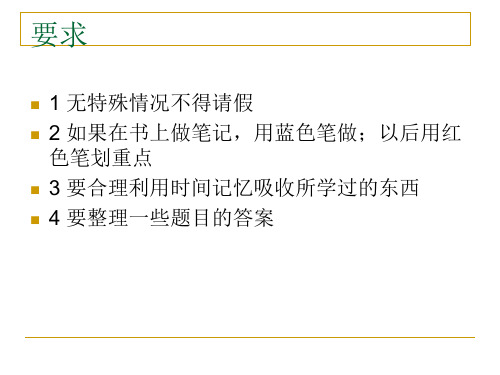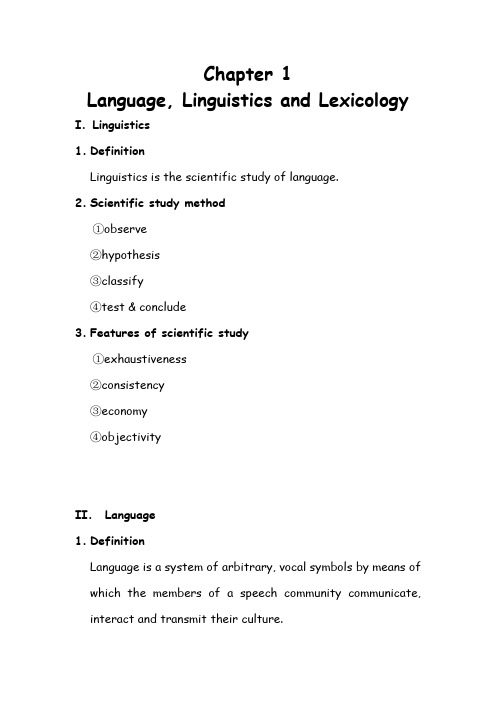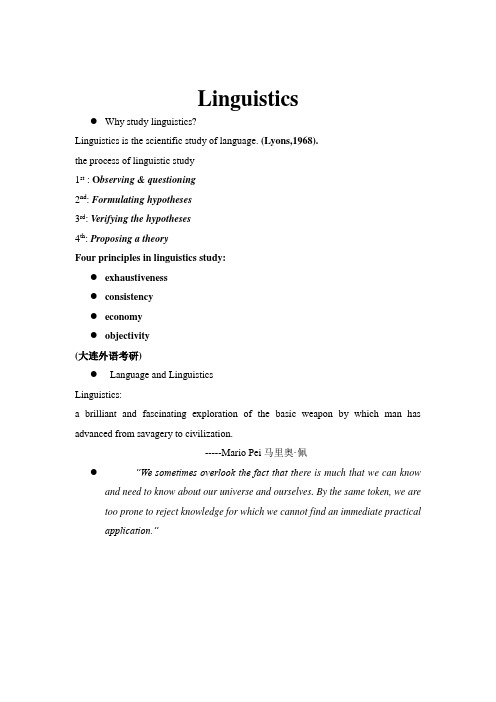第一章英语语言学引论
语言学导论 Chapter 1 Invitations to Linguistics

The
End
Descriptive(描写式)vs. Prescriptive(规定式) ♦ Descriptive:a lingustics study that aims to describe and analyze the language ople actually use.
♦ Prescriptive:a linguistics study that aims to lay down rules for "correct and standard" behavior in using language.i.e.,to tell people what they should say or what they should not say.
Example
▪ Jack said I love you to Rose in the street.
The relationship between langue and parole ● The parole must depend on langue, and without parole, there would not be any existing significance for langue. Langue and parole are interdependent. They together constitute language.
C ha pte r 1 Invita tions to Linguistics
1.9 Im porta nt D istinctions in Linguistics
jijijiijif
contents
• Descriptive vs. Prescriptive • Synchronic vs. Diachronic • Langue vs. Parole • Competence vs. Performance
语言学-第一章ppt课件.ppt

认识到了贫困户贫困的根本原因,才 能开始 对症下 药,然 后药到 病除。 近年来 国家对 扶贫工 作高度 重视, 已经展 开了“ 精准扶 贫”项 目
meaning in a context of language use. Wife: Oh ,darling, I like this gold earring very
much. Husband: You know, I’m now out of job. What is the semantic meaning of the 2
----A person who studies linguistics is known as a linguist.
认识到了贫困户贫困的根本原因,才 能开始 对症下 药,然 后药到 病除。 近年来 国家对 扶贫工 作高度 重视, 已经展 开了“ 精准扶 贫”项 目
II The major branches of linguistics
sentences? What is the pragmatical meaning?
认识到了贫困户贫困的根本原因,才 能开始 对症下 药,然 后药到 病除。 近年来 国家对 扶贫工 作高度 重视, 已经展 开了“ 精准扶 贫”项 目
2.7 Sociolinguistics(社会语言学)is the study of
认识到了贫困户贫困的根本原因,才 能开始 对症下 药,然 后药到 病除。 近年来 国家对 扶贫工 作高度 重视, 已经展 开了“ 精准扶 贫”项 目
Ⅲ Some important distinctions in
新编简明英语语言学 第一章

What is linguistics?
---It is a scientific study because it is based on the systemetic investigation of linguistic data, conducted with reference to some general theory of language structure.
> Modern linguistics regards the spoken language as primary, not the written. Traditional grammarians tended to emphasize the importance of the written word.
---Hall, 1968
语言是“人类利用约定俗成的任意性视听符号借以相互交流和影响的习惯体 系”。
---霍尔 , 1968
What is language?
From now on I will consider language to be a set (finite or infinite) of sentences, each finite in length and constructed out of a finite set of elements.
synchronic and diachronic
>The description of a language at some point of time in history is a synchronic study.
对历史上某一时间点的语言状况 所作的研究是共时研究
>The description of a language as it changes through time is a diachronic study.
英语词汇学引论(笔记) chapter 1

Chapter 1 Language, Linguistics and LexicologyI.Linguistics1.DefinitionLinguistics is the scientific study of language.2.Scientific study method①observe②hypothesis③classify④test & conclude3.Features of scientific study①exhaustiveness②consistency③economy④objectivitynguage1.DefinitionLanguage is a system of arbitrary, vocal symbols by means of which the members of a speech community communicate, interact and transmit their culture.2.Functions·interrogative·expressive·informative·evocative·directive·performative·phaticrmation transmissionSemantic encoding↓Grammatical encoding↓Phonetic & phonological encoding (pitch, loudness, length, quality)↓Sending↓Transmission4.Origins of the calendarBabylonian→Egyptian→Greek→(750 BC)Old Roman1)Months·750 BCMarch MarsApril Goddess of love May Goddess of spring June God of marriage ※Quintillis Five※Sextillis Six September SevenOctober Eight November Nine December Ten·500 BCJanuary ‘door’February ‘festival’·46 BCQuintillis→July Julius Caesar Sextillis→August Augustus Caesar 2)DaysSunday God of Sun (Babylonian) Monday God of Moon (Norse) Tuesday Chief of all gods (Nor.) Wednesday God of commerce (Nor.)Thursday God of Thunder (Nor.) Friday God of Love (Nor.) Saturday God of Harvest (Bab.)III.Lexicology1.Basic terms and definitionsword (OE): talk, speakvocabulary (MLat): ①all words in a certain realm②words in specific context lexicon (lexis): words in a special language lexicology: origins + development + meanings of words 2.English Lexicology·morphonological structures·formation·semantic structure relations·usages·lexicography3.A poem~Spring, the sweetest spring, is the year’s pleasant King Then blooms each thing, then the maids dance in a ring Cold doth not sting, the pretty birds do singKoo-koo, juck-juck, puwe, to-witta-wooThe palm and may make country houses gay Lambs frisk and play, the shepherds pipe all day And we hear aye birds tune this merry layKoo-koo, juck-juck, puwe, to-witta-wooThe fields breeze sweet, the daisies kiss our feet Young lovers meet, old wives a-sunning sitIn every street, these tunes our ears do greet Koo-koo, juck-juck, puwe, to-witta-woo。
Chapter One(A) 英语词汇学课程简介

兼任 湖北省学位委员会评议组成员、华中师范大学学位 委员会第3、4届委员、教育部人文社科基地华中师大语言 与语言教育研究中心兼职研究员。学术兼职包括全国专业 英语研究会理事、中南地区外语教学法研究会副理事长、 湖北省翻译者协会副会长、武汉欧美同学会常务理事等。 被邀担任教育部全国本科教学评估专家和教育部出国留学 基金语言学评审专家。同时担任上海外语教育出版社教育 部"十五"规划项目英语专业教材编写委员会委员,重庆出 版社中西部英语专业系列教材编写委员会委员。 主讲 英语词汇学、文体学、语义学等理论课程。从事语 言学和应用语言学方面的研究,并对话语篇章、语用、语 言与文化等有浓厚的兴趣。
近年来,汪榕培教授在中国古典文学英译和中西 文化比较等方面取得了突破性的进展,先后完成 了 《英译老子》、《英译易经》、 《英译陶诗》、 《英译诗经》、《英译庄子》、 《英译邯郸记》 《英译汉魏六朝诗三百首》、 《英译牡丹亭》、 《英译孔雀东南飞· 木兰诗》、等译著, 并撰写了一系列相关的论文,出版了专著《比较 与翻译》和《陶渊明诗歌英译比较研究》,得到 国内外学者的高度重视。他目前正在继续进行典 籍英译研究工作,兼任苏州大学、大连理工大学 博士生导师。
What we shall learn in ish lexicology is more than to learn to remember new words,but it will make you powerful in learning new words. 有人误认为词汇学就是“学词汇”。
4.所有作业,独立完成,不能抄袭 ,否则扣分。
Chapter One
The Basic Concepts of Words and Vocabulary
英语语言学语言学知识点课件

4. scope of linguistics
(语言学的研究范围)
英语语言学语言学知识点
3
• 1. design feature of language(语言的定义特征)
defining properties of human language that distinguish it from any animal system of communication
英语语言学语言学知识点
40
• 音系学定义:study of how speech sounds in a language form patterns and how these sounds are used to convey meaning in linguistic communication.
英语语言学语言学知识点
34
• 如何记忆phonetics和phonolgy的区别: • 联想: mathematics, physics, mechanics
•
phonetics 语言学,-ics科学性更强
•
•
geology, sociology, astrology
•
phonology 音系学,-ology人文性更强
英语语言学语言学知识点
30
• Phonetics studies all speech sounds in human languages: how they are produced, transmitted and how they are received.
• Phonology: aims to discover how speech sounds in a language form patterns and how these sounds are used to convey meaning in linguistic communication.
英语语言学引论

It is a branch of linguistics that focuses on the scientific description of speech sounds
It is divided into two subfields: academic phones and audit phones
The classification of vocabulary helps us understand the structure and organization of language
Physiological Changes of Words and Derived Words
01
Philosophy is the study of the internal structure of words
Semantic relationships and semantic fields
01
Semantics is the study of the meanings of words and how they are related to each other
02
Semantic relationships include synonymy (similar means), antonymy (potential means), and hybridization (specific to general means)
Linguistics is divided into different branches, including phonetics, morphology, syntax, semantics, sociolinguistics, and psychology
语言学第一章课件

Linguistics●Why study linguistics?Linguistics is the scientific study of language. (Lyons,1968).the process of linguistic study1st : O bserving & questioning2nd: Formulating hypotheses3rd: Verifying the hypotheses4th: Proposing a theoryFour principles in linguistics study:●exhaustiveness●consistency●economy●objectivity(大连外语考研)●Language and LinguisticsLinguistics:a brilliant and fascinating exploration of the basic weapon by which man has advanced from savagery to civilization.-----Mario Pei马里奥·佩●“We sometimes overlook the fact that th ere is much that we can knowand need to know about our universe and ourselves. By the same token, we are too prone to reject knowledge for which we cannot find an immediate practical application.”Chapter 1When we study human language, we are approaching what some might call the “human essence”, the distinctive qualities of mind that are, so far as we know, unique to man. (Noam Chomsky, 1972, Language and Mind)●乔姆斯基(Noam Chomsky, 1928--)●“Chomsky is currently among the most-cited writers in all of the humanities(behind only Marx, Lenin, Shakespeare, Aristotle, Plato, and Freud) and the only living number of the top ten.” (Pinker,1994)● 1. What is Language?●Definitions of Language:Language is a system of arbitrary vocal symbols used for human communication.Key words:Language as systemSound <Phonetics发音学< Phonology 音韵学Structure <morphology 形态学<Syntax 句法学meaning <Semantics语义学<Pragmatics 语用学●Definitions of Language:●Language is a means of verbal communication.It is instrumental; it is social and conventional.(P3)2.Origin of language●The …Divine‟ origin:●The “bow-wow” theory “汪汪理论”●Imitation of the sounds of the animal●OnomatopoeicProblematic (P9)●The “pooh-pooh” theory噗噗理论●instinctive sounds of pain, anger and joy.●interjections●Problematic (P9)●The “yo-he-ho” theory“哟-嗬-哟理论”rhythmic grunts●Problematic (P9)● 3. Design Features of Language●Design features (本质特征) refer to the defining properties of human languagethat distinguish it from any animal system of communication. (P4)●Language distinguishes human beings from animals in that it is far moresophisticated than any animal communication system.● 2.Design features2.1 Arbitrariness2.2 Duality2.3 Creativity2.4 Displacement● 1. Arbitrariness●--Ferdinand de Saussure 索绪尔(Swiss)●the forms of linguistic signs bear no natural (logical, intrinsic)relationship to their meaning●At lexical level:词汇层面“A rose by any other name would smell as sweet.”---Shakespeare in Romeo and JulietCan onomatopoeia change the arbitrary nature of language?●at the syntactic level●language is not arbitrary at the syntactic level.●(a) He came in and sat down.●(b) He sat down and came in.●(c) He sat down after he came in.Arbitrariness and convention●Duality(双重性)●Duality means that language has two levels of structure, the primary leveland the secondary level.●At secondary level are elements which have no meaning but which combine toform units at primary level which do have meaning.●Secondary level is made up of meaningless sounds, and primary level ofmeaningful words.●Does the traffic light system have duality?Creativity (创造性)Recursiveness (递归性)means that one sentence can expand into endless possible sentences in a way of recurring.Displacement (移位性)●Displacement enables us to talk about a wide range of things.Unlike animal communication systems, human language is ()(电子科大2003考研)(p8)A.Stimulus freeB.Stimulus boundC.Under immediate stimulus controlD.Stimulated by some occurrence of communal interest4. Functions of language1 Informative(信息功能)2 Interpersonal function(人际功能)It embodies the use of language to express, establish and maintain social relations. The ways you talk to different people show your social status.3 Performativ e (施为功能)It means that language is also used to “do things”, to perform actions.It is primarily to change the social status of a person, or the state of a thing.4 Emotive function(感情功能)It is the use of language to reveal some feelings and attitudes of the speaker.5 Phatic communion (寒暄功能)It refers to language used for maintaining social contact rather than exchanging information or ideas.6 Recreational function (娱乐功能)It refers to the use of language for the sheer joy of using it.7. Metalingual function (元语言功能)The metalingual function is used to clarify meanings or what the other personhas said.5. Important Distinctions1 Descriptive vs. prescriptive2 Synchronic vs. diachronic3 Langue vs. parole4 Competence vs. performance1 Descriptive vs. Prescriptive (描写式和规定式)A linguistic study is descriptive if it describes and analyses facts observed; it is prescriptive if it tries to lay down rules for correct behavior.The description of a language at any one time is a synchronic study; the description of a language as it changes through time is a diachronic study.__________ studies a particular state of language;__________ studies the historical development of a language.Parole refers to the realization of langue._______: abstract_______: specific_______: stable and systematic_______: subject to personal and situational constraintsAs a social product, langue is a set of conventions that members of a speech community seem to abide by. Parole, on the other hand, is the concrete use of the conventions.Competence is the language user’s intuitive knowledge of his language.Performance is the actual realization of this knowledge in utterances.A speaker’s competence is s_____, but his performance is often influenced by p___________ factors.Where does the knowledge of language come from?Chomsky’s solution is to invoke the innate properties of the mind.What is the difference between these two pairs of distinction?Similarity:Difference:Saussure looks at language from a ___________ point of view;Chomsky looks at it more from a _____________ point of view.According to Saussure and Chomsky, which should be studied, the abstract knowledge or the actual speech?The significance of these two distinctions lies in defining the task of linguistics, which is to discover langue from instances of parole, to discover the language knowledge of the speaker from his performances.。
- 1、下载文档前请自行甄别文档内容的完整性,平台不提供额外的编辑、内容补充、找答案等附加服务。
- 2、"仅部分预览"的文档,不可在线预览部分如存在完整性等问题,可反馈申请退款(可完整预览的文档不适用该条件!)。
- 3、如文档侵犯您的权益,请联系客服反馈,我们会尽快为您处理(人工客服工作时间:9:00-18:30)。
“A language is a system of arbitrary vocal symbols by means of which the members of a society interact in terms of their total culture.” --George Trager: The Field of Linguistics (1949)
“From now on I will consider language to be a set (finite or infinite) of sentences, each finite 限制的) (限制的)in length and constructed out of a finite set of elements.” --Noam Chomsky (1928): Syntactic Structures (1957)
“The question ‘What is language?’ is comparable(可比较 ( 的) with -- and, some would say, hardly less profound than -- ‘What is life?’, the presuppositions(预先假设) of (预先假设) which circumscribe (限制)and unify the biological 限制) sciences... it is not so much the question itself as the particular interpretation (解释)that the biologist puts 解释) upon it and the unravelling (阐明)of its more detailed 阐明) implications within some currently accepted theoretical framework that nourish(支持) the biologist's day-to-day (支持) speculations (推测)and research. So it is for the 推测) linguist in relation to the question ‘What is language?’” --John Lyons (1932- ): Language and Linguistics (1981)
“Language is a purely human and non-instinctive method of communicating ideas, emotions and desires by means of voluntarily produced symbols.” --Edward Sapir (1884-1939): Language: An Introduction to the Study of Speech (1921)
Chapter I Invitations to Linguistics
Why study language? What is language? What is linguistics?
Chapter I
1. 2.
Why study language Language
2.1 Definition 2.2 Origin 2.3 Design features 2.4 Functions 2.5 Typology(类型学) (类型学)
Assessment
Coursework: 30%. Consists of attendance and assignments after each chapter. End-of-term exam: 70%.
Difference with the Freshmen course English
Scope of the course
Core of linguistics
Introduction: ch. 1 Speech sounds: ch. 2 Lexicon: ch. 3(词汇;词汇表) Syntax: ch. 4 Meaning : ch. 5 Language in use: ch. 8
1.2 Some fundamental views about L
Children learn their native language swiftly, efficiently and without instruction. Language operates by rules. All languages have three major components: a sound system, a system of lexicogrammar(词汇学) and a (词汇学) system of semantics.(语义学) (语义学) Everyone speaks a dialect.(地方话) (地方话) Language slowly changes.
Linguistics in the wider perspective
Language and mind: ch. 6 Language, culture and society: ch. 7 Language in literature: ch. 9 Language in the computer age: ch. 10 Language teaching and learning: ch. 11 Schools & theories of linguistics: ch. 12
2. What is Language?
Definition
Language “is not to be confused with human speech, of which it is only a definite part, though certainly an essential one. It is both a social product of the faculty(能力) (能力) of speech and a collection of necessary conventions that have been adopted by a social body to permit individuals to exercise that faculty”. --Ferdinand de Saussure (1857-1913): Course in General Linguistics (1916)
Language is “the institution whereby humans communicate and interact with each other by means of habitually used oral-auditory(听觉的) arbitrary (听觉的) symbols.” --Robert A. Hall (1911-1997): Introductory Linguistics (1964)
Taught in English Textbook written in English Content more demanding
is Fun!
Possible difficulties
Terminology(术语) Theoretical thinking System of knowledge Problem-solving
1.1 Some myths about language
Language is only a means of communication. Language has a form-meaning correspondence. The function of language is to exchange information. English is more difficult to learn than Chinese. Black English is not standard and should be reformed.
“A language is a system of arbitrary vocal symbols by means of which a social group co-operates.” --Bernard Bloch (1907-1965) & George Trager (1906-1992): Outline of Linguistic Analysis (1942)
3. Linguistics
3.1 Definition 3.2 Scope 3.3 Important distinctions
1. Why Study Language?
1. Why study language
Language is an integral part of our life and humanity. Yet we know little or even have wrong ideas about it. The subject of language is intriguing and useful. Where does language come from? How? When? Why is language human-specific? Why can a child learn his/her mother tongue so easily? Languagecan we say one a way but mean another? How can be used as thing of finding out: How the brain works. Language has a form-meaning correspondence. How children learn language.to exchange information. The function of language is Why people use different varieties of language. What the role of language is in different cultures, etc.
